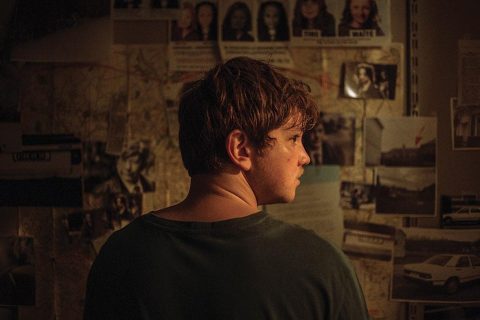Marc Dutroux might not be a household name, but everyone in Belgium certainly knows him. Convicted in 1989 for abducting and raping five young girls, he only served three years and committed similarly heinous crimes (including the murder of four more) upon release. Fabrice du Welz’s new thriller Maldoror (2024), named after the undercover police operation that eventually brought Dutroux and his accomplices to justice, stars Anthony Bajon as Paul Chartier, a young, idealistic Gendarme assigned to a secret, three-man team tailing a sex offender who may be linked to the disappearance of two girls.
Right off the bat with its gritty/stylish opening credits, it’s clear Du Welz has seen a lot of David Fincher films. Du Welz uses Zodiac (2007) and Seven (1995) as blueprints in terms of style, plotting, and themes. Paul’s obsession with finding the end of the rabbit hole more or less mirrors that of Robert Graysmith, the cartoonist Jake Gyllenhaal plays in Zodiac. Both men neglect themselves and their families in pursuit of the truth, putting all parties involved in danger.
Both Maldoror and Zodiac clock in around two and a half hours — Du Welz is clearly aiming for that nasty, slow burn. Perhaps taking a note from The Deer Hunter’s (Micael Cimino, 1978) hour-long opening wedding scene, Du Welz pauses early on to spend ten minutes on Paul’s wedding. It’s a lively, well-shot sequence filled with joy that adds emotional depth and raises the stakes for later events. The dense plot bounces between various criminals and multiple police agencies, not to mention a complicated, offscreen backstory linked to a key character. Du Welz has a knack for keeping everything in order, the script gradually introducing new players while revealing the right amount of information, at the right time.
The Dutroux case is known not just for its unrelenting ugliness, but also the massive public outcry that eventually caused a complete overhaul of the judicial system in Belgium. Maldoror constantly emphasises the difficulty in having multiple jurisdictions or branches of law enforcement working on the same crimes, and how the lack of cooperation due to immature rivalries can negatively affect investigations. This also allows for casual bits of humour and further dramatic twists as Paul and his partner (Alexis Maneti) interact with the Judicial force and certain loyalties are tested later on. Bajon took home a much-deserved Best Actor trophy back in Berlinale for La Priere (Cédric Kahn, 2018), playing a damaged heroin addict. He’s just as intense here, spiralling down in much the way he spiralled up in the previous film.
In some ways, Maldoror’s fictionalisation of events lessens the impact of the film. At the heart of all this is a rather basic good guy vs. bad guys narrative, with a made-up hero fighting movie criminals based on truly awful people. True crime films including Zodiac take liberties with facts and personalities, making composite characters and whatnot, but Graysmith and Toschi were real people who lived through the ordeal. That made the experience as a viewer sting just a bit more. Knowing that lives and marriages were destroyed without an arrest or conviction, let alone a theory everyone agrees on, was a shattering experience. Although Paul’s heroic endeavours might be completely made up, and the film’s striking tonal resemblance to other serial killer films might seem a bit generic, this is still a solid thriller. You might just need to hit Wikipedia for the real story afterwards.

Editor-at-large Jared loves movies and lives with Kiki in Berlin.




